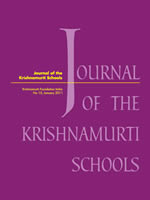Issue 15 - January 2011
- Written by J. Krishanmurti
In all our schools the educator and those responsible for the students, whether in the classroom, on the playing field or in their rooms, have the responsibility to see that fear in any form does not arise.
- Written by P. Ramesh
True to its eclectic character, this fifteenth issue of the Journal of Krishnamurti Schools has a collection of articles on diverse subjects and topics.
- Written by Shailesh Shirali
‘Is man a part of nature, or apart from nature?’ It seems paradoxical to ask such a question.
- Written by Gary Primrose
As it is the United Nations’ Year of Biodiversity, it seems an appropriate time to stand back and take stock of the way we teach environmental education in Krishnamurti Schools.
- Written by Kamala V. Mukunda
The following is an interview with Gerard Bayle, a professional theatre actor who has been working with students in the UK and India for many years.
- Written by Shagufta Siddhi
I joined Rajghat Besant School, Varanasi, in July 2009 as a resource person to teach Class XII students.
- Written by Anant Mahajan
Outdoor activities form an integral part of school education.
- Written by Gurvinder (Neetu) Singh
The Study Centre at Bangalore has been conducting programs for the school children of The Valley School since 1993.
- Written by R. E. Mark Lee
Excerpts from a talk given at the International Symposium on ‘Being Alive to Responsible Citizenship: J. Krishnamurti and the Challenge for Education’.
- Written by Lionel Claris
‘What I am trying to say is that insight is never partial; I am talking of total, not partial, insight … An artist can have a partial insight.
- Written by Raji Swaminathan
The razzle-dazzle of technology and media has captured the hearts and minds of teenagers, far outpacing parents’ and teachers’ ability to hold the attention of youth.
- Written by O. R. Rao
Do animals feel fear? On the face of it, this seems to be an absurd question, for of course, animals do feel fear.
- Written by Editors
When the editors’ team met in July 2010 to discuss the content of the new edition the discussion turned to the number of suicides by young people reported daily in newspapers.
- Written by Kamala V. Mukunda and P. Ramesh
Suppose you were to ask a young child, 13 years old, to write down her answer to the question: what are you afraid of?
- Written by Aarti Kawlra
Adolescence is marked in every culture by what anthropologists have called ‘rites of passage’ involving the social recognition of entry into puberty, usually through a formal ritual or ceremony.
- Written by Alok Mathur
Teachers are human beings too. And being human, they share in the fears that human beings live with.
- Written by Venkatesh Onkar
Over the centuries, the theories we have devised have gradually changed our image of ourselves, and in so doing they have subtly altered the contents of consciousness.


